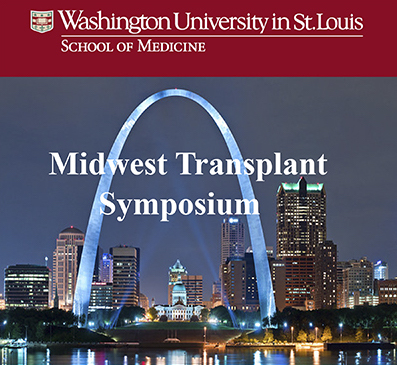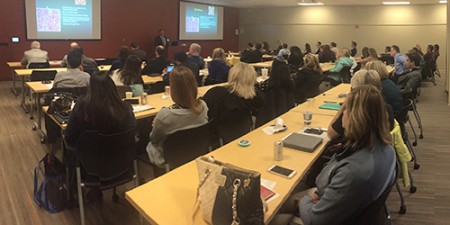 In an effort to share best practices and build collaborative relationships, Washington University School of Medicine hosted the first Midwest Transplant Symposium on October 16-17. The symposium, presented by the Renal Division in the Department of Internal Medicine, brought in three keynote speakers:
In an effort to share best practices and build collaborative relationships, Washington University School of Medicine hosted the first Midwest Transplant Symposium on October 16-17. The symposium, presented by the Renal Division in the Department of Internal Medicine, brought in three keynote speakers:
Anil Chandraker, MD: Associate Professor of Medicine and Medical Director of Kidney and Pancreas Transplantation at Brigham and Women’s Hospital, Harvard Medical School. Chandraker is the President-Elect of the American Society of Transplantation (AST) and discussed “Immunosuppression: Standard and Alternatives.”
Milagros D. Samaniego, MD: Professor of Medicine and Medical Director of Kidney and Pancreas Transplantation at the University of Michigan. Samaniego’s lecture focused on “Antibody Body Mediated Rejection: Where are We?”
Krista L. Lentine, MD, PhD, MSC: Professor of Medicine at Saint Louis University and the Saint Louis University Center for Outcomes Research as well as Co-Chair of the new Kidney Disease: Improving Global Outcomes (KDIGO) Guidelines for Living Kidney Donation. Lentine presented on the “Management of Living Donor.”
Course co-directors were Tarek Alhamad, MD, MS, Director of Transplant Epidemiology Research Collaboration (TERC) of Washington University’s Institute of Public Health, and Daniel Brennan, MD, FACP, Medical Director of Transplant Nephrology.
“It was an opportunity to present an in-depth review of the most clinically encountered topics in transplantation,” says Alhamad. “It was the first transplant symposium organized by Washington University and it provided a wonderful forum for the exchange of new scientific and clinical information relevant to kidney and pancreas transplantation.”
Washington University and Barnes-Jewish Hospital transplant specialists have been pioneers in the field of kidney and pancreas transplants and oversee the largest kidney transplant program in Missouri. The team is recognized for having one of the lowest acute rejection rates — less than five percent — in the country.
